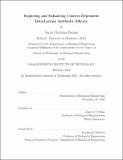Exploring and enhancing context-dependent beta-lactam antibiotic efficacy
Author(s)
Bening, Sarah Christine.
Download1252627296-MIT.pdf (2.099Mb)
Other Contributors
Massachusetts Institute of Technology. Department of Biological Engineering.
Advisor
James J. Collins.
Terms of use
Metadata
Show full item recordAbstract
Antibiotics, such as beta-lactams, are essential medical tools for the treatment of bacterial infections. Unfortunately, clinical treatment efficacy is declining over time as bacteria adapt to and evade antibiotic treatment through mechanisms called antibiotic resistance, tolerance, and persistence. Antibiotic tolerance and persistence, in particular, are often context-dependent phenotypes: environmental factors can influence bacterial physiology and alter antibiotic efficacy. Optimal antibiotic use, as well as strategies to enhance antibiotic efficacy, can therefore be informed by studies of context-dependent antibiotic action. In this thesis, I present three vignettes about beta-lactam antibiotic efficacy and how environmental context alters in vitro treatment outcomes. First, I explore bacterial killing in multi-drug contexts, focusing on how different beta-lactams can have different effects in combination with antibiotics of other classes. Second, I present a new counter-tolerance method using metabolic stimulation to sensitize tolerant, stationary phase bacteria to beta-lactam antibiotics. Third, I present an extension of this metabolic counter-tolerance strategy, now combining metabolic and target-specific stimulation to further enhance beta-lactam efficacy. I demonstrate that this combined approach, when coupled with beta-lactamase inhibitors, restores beta-lactam sensitivity to simultaneously tolerant and resistant cultures of clinically relevant pathogens. I conclude by discussing opportunities for future study into antibiotic context-dependence and the application of counter-tolerance approaches such as the one described in this thesis.
Description
Thesis: Ph. D., Massachusetts Institute of Technology, Department of Biological Engineering, February, 2021 Cataloged from the official PDF version of thesis. Includes bibliographical references (pages 77-89).
Date issued
2021Department
Massachusetts Institute of Technology. Department of Biological EngineeringPublisher
Massachusetts Institute of Technology
Keywords
Biological Engineering.